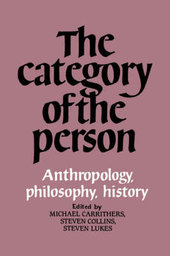
|
The Category of the Person: Anthropology, Philosophy, History
Paperback / softback
Main Details
| Title |
The Category of the Person: Anthropology, Philosophy, History
|
| Authors and Contributors |
Edited by Michael Carrithers
|
|
Edited by Steven Collins
|
|
Edited by Steven Lukes
|
| Physical Properties |
| Format:Paperback / softback | | Pages:320 | | Dimensions(mm): Height 229,Width 155 |
|
| ISBN/Barcode |
9780521277570
|
| Classifications | Dewey:302.54 |
|---|
| Audience | | Professional & Vocational | |
|---|
| Illustrations |
Worked examples or Exercises
|
|
Publishing Details |
| Publisher |
Cambridge University Press
|
| Imprint |
Cambridge University Press
|
| Publication Date |
27 December 1985 |
| Publication Country |
United Kingdom
|
Description
The concept that peope have of themselves as a 'person' is one of the most intimate notions that they hold. Yet the way in which the category of the person is conceived varies over time and space. In this volume, anthropologists, philosophers, and historians examine the notion of the person in different cultures, past and present. Taking as their starting point a lecture on the person as a category of the human mind, given by Marcel Mauss in 1938, the contributors critically assess Mauss's speculation that ntions of the person, rather than being primarily philosophical or psychological, have a complex social and ideological origin. Discussing societies ranging from ancient Greece, India, and China to modern Africa and Papua New Guinea, they provide fascinating descriptions of how these different cultures define the person. But they also raise deeper theoretical issues: What is universally constant and what is culturally variable in people's thinking about the person? How can these variations be explained? Has there been a general progressive development toward the modern Western view of the person? What is distinctive about this? How do one's notions of the person inform one's ability to comprehend alternative formulations? These questions are of compelling interest for a wide range of anthropologists, philosophers, historians, psychologists, sociologists, orientalists, and classicists. The book will appeal to any reader concerned with understanding one of the most fundamental aspects of human existence.
|